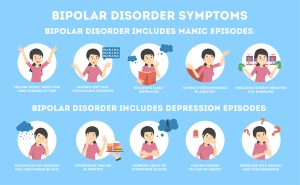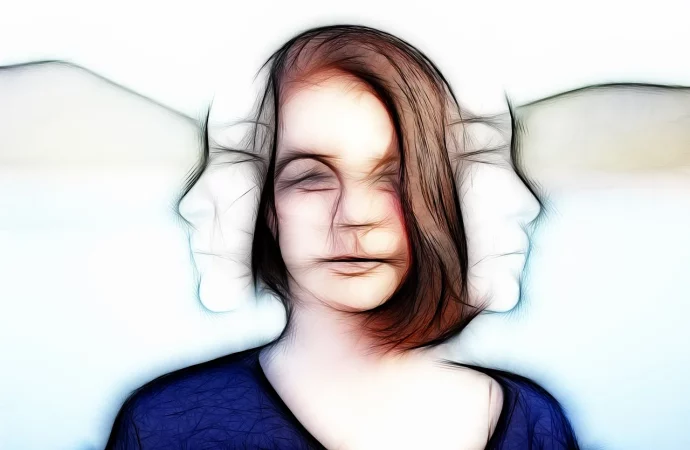Introduction Bipolar disorder, a mental health condition characterized by extreme mood swings, is commonly associated with older teenagers and young adults. However, its presence in children as young as 6 has sparked controversy within the medical community. This article delves into the complexities of bipolar disorder diagnosis in young children and explores effective strategies for
Introduction
Bipolar disorder, a mental health condition characterized by extreme mood swings, is commonly associated with older teenagers and young adults. However, its presence in children as young as 6 has sparked controversy within the medical community. This article delves into the complexities of bipolar disorder diagnosis in young children and explores effective strategies for parents of children and teenagers grappling with this condition.
Bipolar Disorder in Young Children
Diagnosis Challenges
Diagnosing bipolar disorder in young children poses significant challenges. The symptoms often overlap with attention deficit hyperactivity disorder (ADHD) and conduct disorders. Distinguishing between normal childhood behavior and potential indicators of bipolar-disorder becomes a delicate task for healthcare professionals.

Image by: yendex.com
Different Symptoms
- Manic Episodes: Periods of intense energy, euphoria, and heightened activity levels.
- Depressive Episodes: Prolonged periods of low energy, sadness, and a sense of hopelessness.
- Rapid Cycling: Quick shifts between manic and depressive phases within a short time.
- Psychotic Symptoms: Experiencing hallucinations or delusions during extreme mood episodes.
- Irritability: Heightened sensitivity and easily provoked emotional responses.
- Changes in Sleep Patterns: Disruptions in normal sleep routines, either excessive sleep or insomnia.
- Impaired Concentration: Difficulty focusing or maintaining attention on tasks.
- Suicidal Thoughts: Persistent thoughts about self-harm or ending one’s life.
- Elevated Mood: Feeling excessively happy or elated, often beyond what is typical.
- Fatigue: Persistent feelings of tiredness and lack of energy.

Image by: yendex.com
Caution with Medications
A crucial consideration in treating bipolar disorder in children is the cautious use of medications. Stimulants commonly prescribed for ADHD can potentially trigger manic episodes in children with bipolar-disorder. Parents are advised to be vigilant and discuss potential risks with their child’s healthcare provider.

Image by: www.corkbeo.ie
How Can I Help my Bipolar Child?
Medication Management
Ensuring a strict medication schedule is vital for the effective management of bipolar-disorder in children. Parents are encouraged to use timers, pillboxes, or other reminders. Coordination with school authorities is essential if medication needs to be administered during school hours.

Image by: media.istockphoto.com
Monitor Side Effects
Most medications for bipolar disorder were initially tested in adults, and their effects on children are not as well-studied. Parents should be aware of potential side effects, such as weight gain and changes in blood sugar and cholesterol. Routine monitoring of bloodwork may be recommended by healthcare providers.
Collaboration with Teachers
Children may require special allowances at school. Discussions with teachers about extra breaks or reduced homework during challenging times can contribute to a supportive learning environment. In some cases, temporary withdrawal from school may be considered until bipolar symptoms stabilize.

Photo by: www.pexels.com
Establish Routine
Consistency is key in supporting children. Establishing a daily routine that includes regular sleep, meal, and exercise times can contribute significantly to managing stress in the household.
Family Therapy
Recognizing the broader impact on the family, including potential stress on marriages and the emotional needs of siblings, family therapy can be a valuable resource. It provides a space to address disruptions and develop coping strategies as a family unit.
Suicidal Threats
Parents must take any expressions of suicidal thoughts or behavior seriously. Immediate action, such as removing potential dangers from the environment and seeking professional help, is crucial in ensuring the safety of the child.

Image by: yendex.com
Teenagers With Bipolar Disorder
Similarities to Adults
As teenagers mature, the symptoms and treatment of bipolar disorder align more closely with those observed in adults. Communication about treatment options becomes increasingly important to avoid an adversarial relationship.
Involving Teenagers
Teenagers with bipolar disorder may resist treatment if they feel it is imposed upon them. Involving them in discussions, alongside healthcare professionals, can foster a collaborative approach. Open conversations about the risks associated with alcohol and drugs are essential, as these substances can interact with medications or exacerbate mood episodes.
Establishing Routines
Maintaining regular routines around sleep and wake times is crucial for teenagers with bipolar disorder. Additionally, developing effective coping strategies for managing stress and distress becomes a central aspect of their overall well-being.
Conclusion
Understanding and managing bipolar disorder in children and teenagers require a comprehensive approach. From navigating the challenges of diagnosis to implementing effective strategies for daily life, parents play a pivotal role in supporting their children. Collaborative efforts with healthcare professionals, teachers, and the entire family contribute to creating a supportive environment for those dealing with bipolar disorder.

















Leave a Comment
Your email address will not be published. Required fields are marked with *